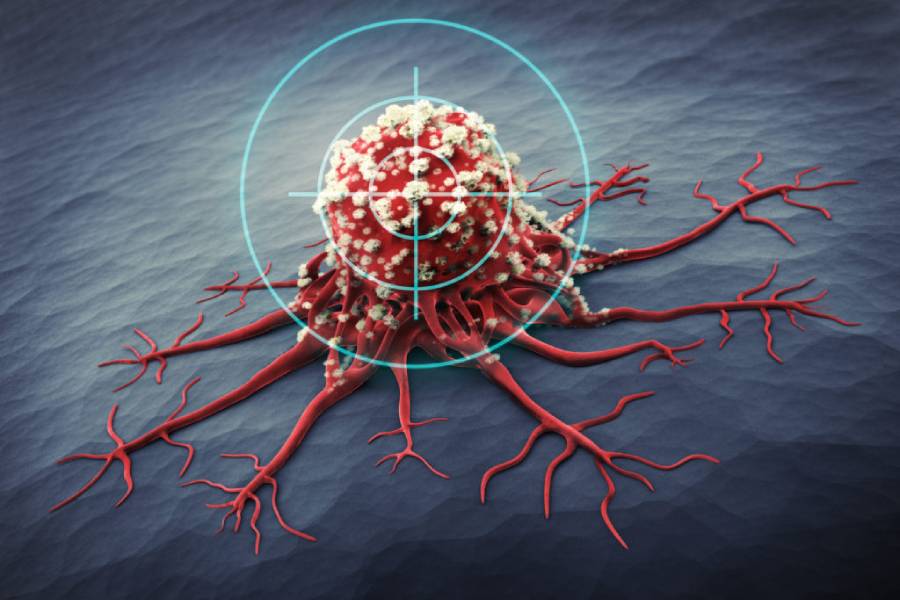Targeted therapy is a type of cancer treatment. It uses drugs to target specific genes and proteins that help cancer cells survive and grow. Targeted therapy can affect the tissue environment that cancer cells grow in or it can target cells related to cancer growth, like blood vessel cells.
Targeted therapy can treat many different types of cancer. It can also be used in combination with other cancer treatments, such as chemotherapy. Currently, not all cancers have targeted therapies available, but this is a rapidly growing area of research and many new targeted therapies are being studied in clinical trials.
How does targeted therapy work to treat cancer?
Many types of cells make up the different regions of the body. For example, there are blood cells, brain cells, and skin cells. Each type has its job. Cancer begins when specific genes in healthy cells change and become abnormal over time. This change is called a genetic mutation or alteration.

Genes tell cells how to make proteins to keep the cell working. If the genes mutate, these proteins change, too. This can make cells divide too much or too quickly. When this happens, the cells live much longer than they normally would. These cells grow out of control and form a tumor. Learn more about the genetics of cancer. To develop targeted therapies, researchers work to identify the specific genetic changes that help a tumor grow and change. This is called the drug’s “target.” An ideal target for this kind of therapy would be a protein that is present in cancer cells but not healthy cells. Once researchers have identified a target, they develop a drug treatment that attacks it. Targeted therapies can do different things to the cancer cells they target:
- Block or turn off signals that tell cancer cells to grow and divide
- Prevent the cells from living longer than normal
- Destroy cancer cells
In order to find the right targeted therapy, your doctor may order tests to learn about the genes, proteins, and other factors that are unique to the cancer you have. This helps find the most effective treatment. Like other treatments, targeted therapies can cause side effects, so your doctor must match your tumor to the best possible treatment and dose. The recommended dose of targeted therapy is based on many factors, like body weight and your risk of developing severe side effects. Talk to your health care team about why they recommend a certain dose.
What are the different types of targeted therapy?
There are several different types of targeted therapy. The most common types are monoclonal antibodies and small-molecule drugs.
- Monoclonal antibodies. Drugs called monoclonal antibodies block a specific target on the outside of cancer cells. The target might also be in the area around the cancer cells. Monoclonal antibodies can also send toxic substances right to cancer cells. For example, they can help chemotherapy and radiation therapy reach cancer cells better. Some monoclonal antibodies are also considered a type of immunotherapy, while others are not.
- Small-molecule drugs. Drugs called small-molecule drugs can block the process that helps cancer cells multiply and spread. Angiogenesis inhibitors are an example of this type of targeted therapy. Angiogenesis is the process for making new blood vessels. Tumors need blood vessels to bring it nutrients. Angiogenesis inhibitors starve the tumor by keeping new blood vessels from forming in the tissue around it.
Are there limitations to targeted therapy?
As with any cancer treatment, targeted therapy may not be the best treatment for every person with cancer. It may seem simple to use a drug for your specific cancer, but targeted therapy is complex, and it may not be the right drug for you. It is important to know that:
- A targeted treatment will not work if the tumor does not have the specific genetic change or protein the drug targets
- Even if you have the specific genetic change or protein the drug targets, it’s possible the tumor will not respond to the drug
- The response to the treatment may not last over time
For example, the target may not be as important for the cancer’s growth as previously thought, so the drug does not provide much benefit. Or cells may become resistant to targeted therapy, so the drug may work at first but then stop working overtime. If this happens, the doctor will talk with you about other treatment options.
Looking for targeted therapy in Pune?
Dr. Lalit Banswal is the best oncologist in Pune with experience of more than 10 years. He has special interests in chemotherapy treatment. For more information about cancer and treatment options, or to book an appointment with the Cancer Specialist in Pune call +91 91580 50180 / 8830497317 or Click on Book Appointment for online booking.
